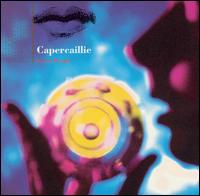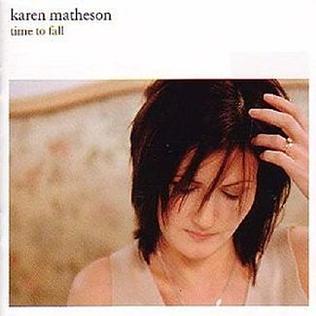
Runrig were a Scottish Celtic rock band formed on the Isle of Skye in 1973. From its inception, the band's line-up included brothers and songwriters Rory MacDonald and Calum MacDonald (percussion). The line-up during most of the 1980s and 1990s, which was the band's most successful period commercially, also included Donnie Munro (vocals), Malcolm Jones (guitar), Iain Bayne (drums), and Pete Wishart (keyboards). Munro left the band in 1997 to pursue a career in politics and was replaced by Bruce Guthro. Wishart left in 2001, also to pursue a career in politics, and was replaced by Brian Hurren. The band released fourteen studio albums, with a number of their songs sung in Scottish Gaelic. At the height of their success during the 1980s and 1990s, Runrig were described by Billboard as one of the "most celebrated" Gaelic language bands in Scotland.

Weights and Measures is a 1997 album by Spirit of the West. It was their final album of new material for Warner Music Canada.

Karen Matheson OBE is a Scottish folk singer who frequently sings in Gaelic. She is the lead singer of the group Capercaillie and was a member of Dan Ar Braz's group L'Héritage des Celtes, with whom she often sang lead vocals, either alone or with Elaine Morgan. She and Morgan sang together on the Breton language song "Diwanit Bugale", the French entry in the Eurovision Song Contest 1996. She made a cameo appearance in the 1995 movie Rob Roy singing the song "Ailein duinn".

Delirium is the fourth studio album by folk rock band Capercaillie released in 1991 by Survival Records. It was issued in North America by Valley Entertainment in 2002.

Get Out is the first compilation album of remixed studio and live tracks by folk rock band Capercaillie originally issued in 1992 and rereleased in 1999 by Survival Records with five bonus tracks. It was reissued in North America by Valley Entertainment in 2002 with new artwork.

Secret People is the fifth studio album by folk rock band Capercaillie. It reached number 40 in the UK album charts. It was re-released in North America by Valley Entertainment in 2003.

Time to Fall is the second solo (studio) album by Karen Matheson, lead singer of the Scottish band Capercaillie.

Gary Innes is a Scottish musician, shinty player, composer and broadcaster from Spean Bridge, Lochaber, Scotland.

Amazing Things is the eighth studio album by the Scottish Celtic rock band Runrig, released in 1993.
Fiona Kennedy Clark, OBE, DL is a Scottish singer, actress and broadcaster, and the daughter of Scottish and Gaelic singers Calum Kennedy and Anne Gillies. As a child she appeared with her parents as they performed as a family, and this developed into a successful solo career.

Sugarolly Days is a 1994 album by Jim Diamond. It is a collection of Scottish folk songs. Gallagher & Lyle appear on several tracks.

Capercaillie are a Scottish folk band, founded in 1984 by Donald Shaw and led by Karen Matheson, and which performs traditional Gaelic and contemporary songs in English. The group adapts traditional Gaelic music and traditional lyrics with modern production techniques and instruments such as electric guitar and bass guitar, though rarely synthesizers or drum machines. Capercaillie demonstrate "astonishing musical dexterity" and feature "the peerless voice of co-founder Karen Matheson. Universally recognised as one of the finest Gaelic singers alive today".
James Grant is a Scottish musician, singer, and songwriter. He grew up in Glasgow's Castlemilk district and still resides in the city.

Transatlantic Sessions is the collective title for a series of musical productions by Glasgow-based Pelicula Films Ltd, funded by- and produced for BBC Scotland, BBC Four and RTÉ of Ireland. The productions comprise collaborative live performances by various leading folk, bluegrass and country musicians from both sides of the North Atlantic, playing music from Scotland, Ireland, England and North America, who congregate under the musical direction of Aly Bain and Jerry Douglas to record and film a set of half-hour TV episodes. The Television director is Mike Alexander and the producer is Douglas Eadie.

The closing ceremony of the 2014 Commonwealth Games, was held on 3 August 2014. Entitled "All Back to Ours", it was held at the Hampden Park, the main stadium of the event, in Glasgow, Scotland.

Urram is the fourth solo (studio) album by Karen Matheson, lead singer of the Scottish folk band Capercaillie, released on CD on 16 October 2015.

Sawdust in My Veins is the debut solo studio album by Scottish singer-songwriter James Grant, released in the UK by Survival Records on 27 April 1998. The album reached number 42 in the Scottish Albums Chart.

My Thrawn Glory is the second solo studio album by Scottish singer-songwriter James Grant, released in the UK by Vertical on 11 December 2000.

"Flower of the West" is a 1991 single released by Scottish celtic rock band Runrig, released as the lead and only single from their seventh studio album The Big Wheel (1991). The single was released on 28 October 1991 and was released by Chrysalis. Upon its release, "Flower of the West" became the highest-charting entry for the band on the UK Singles Charts, following its peak at number forty-three.

















